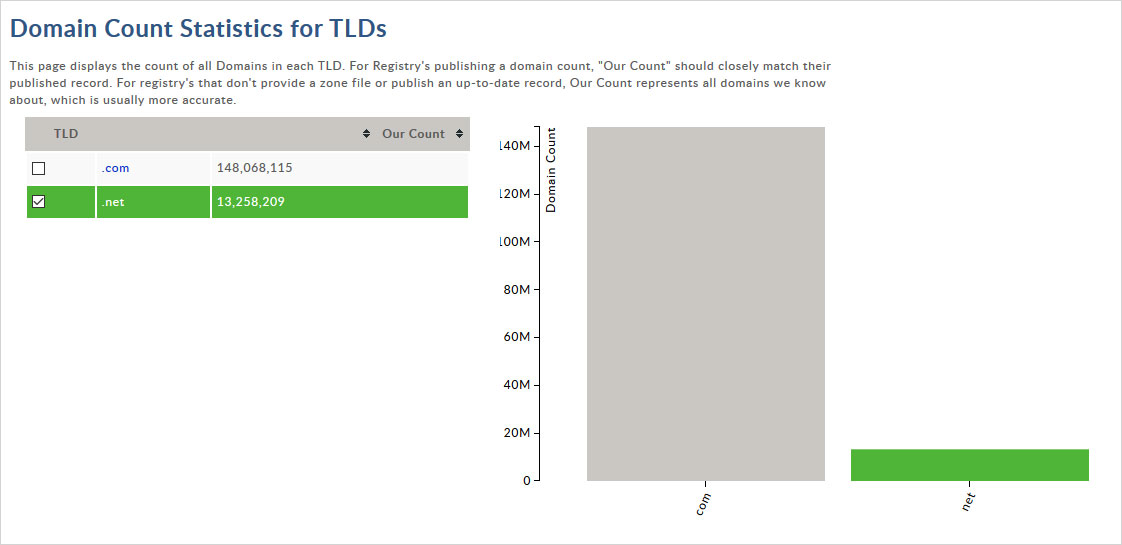Com vs Net Differences
When building a website, one of the first and most important decisions is choosing the right domain name and its Top-Level Domain (TLD). Among the most popular choices are .com and .net. While both are widely recognized, they serve different purposes. This article will dive into the differences between .com and .net, helping you make the best choice for your website.
Com vs Net: What are they?
Domain name is the unique address to your website, which is used by your visitors to gain access to your website on the internet. Whereas, TLD (top level domain) is the suffix to your domain. For instance, templatetoaster.com is a URL, TemplateToaster is the domain name and .com is the TLD of this website. Learn more about what is domain name and how domains work. As far as the pricing is concerned, both .com and .net come out about the same. However, there are other considerations to both of them, let’s go over them.

What is .com?
.com is an abbreviation for commercial sites and is the most popular domain extension on the internet. Any website that makes money online like commercial businesses, including blogging, portfolios, eCommerce sites or any profitable site is a .com site. Due to the high popularity of .com website, domain business name generator tools might suggest you a .net extension, however it is not wise to get a domain extension that doesn’t reflect the nature of your site. It can result in less credibility and high bounce rate.
What is .net?
.net was created for networking websites and is abbreviated for ‘network’. After .com sites, it is the most commonly known TLD. This Domain extension is primarily used by networking websites, including technology-related websites, internet service providers, email and database service providers, etc.
However, there is no hard and fast rule on getting a .com or a .net website. Moreover, nowadays, most businesses register both .com and .net domain extensions to sure no one else can have the same domain as them. On top of that, it also helps to redirect more traffic to their site.
When to use .com?

As mentioned before, .com is the most popular domain extension on the internet and it’s easier to remember because of its immense popularity. Following are some use cases that are suitable for .com websites-
- If you run a blogging site, whether it’s a personal blog, portfolio, photography, news portal, etc, then you should get yourself a .com website.
- In case you run a commercial business and your website represents the online presence of your commercial business, the go for a .com website. Moreover, if your website is an online store/eCommerce website. .com is an appropriate extension for your site.
- For any kind of profitable site, whether it’s a profitable blog, affiliate website, business website, online services site, or anything that generates money for you, then go for a .com website.
- In case, you have registered only .com domain, someone else can register your domain name with .net. To prevent it, you are recommended to buy both domain extensions, therefore, all your traffic is redirected to your site.
When to use .net?
As mentioned before, .net stands for ‘network’ and this domain extension is used for sites that offer networking services. Almost 3.5% of the internet is comprised of .net websites. Following are some use cases that are suitable for .net websites-
- Use this extension when your website is created to offer technology-related services. For instance, php.net is a technology-related website that offers information on PHP language.
- You can use .net extension for your site if it offers network-related services like internet, email, cable, database hosting, etc. This extension will represent the nature of the services you offer.
- If your budget allows, you should buy a .net extension for your .com website to avoid someone else getting it and getting your visitors. Moreover, it will prevent anyone else from defaming your company’s reputation.
Com vs Net: Where to get these Domain Extensions?
To get a domain name, you need to go to an ICANN accredited domain registrar. They can work as an intermediate between you and ICANN, so you can register for your unique domain name. It is the most straightforward method of getting a domain name. Another thing you can do is get a domain name from a web hosting provider. Ultimately, you have to get a web hosting service for your site, why not get a domain as well, as some web hosting providers also offer free domain registrations (for a limited time). If you want to create your own website, you need both domain and web hosting. Here is guide on domain vs web hosting. Have a look at the two main ways to get a domain name-
- Domain registrars- Companies such as Domain.com and GoDaddy offer you a straightforward way to get your domain name registered. They offer an easy to use platform where you can see the availability of your domain name and get it registered for around $9.99 and $4.99* (discounted price), respectively.
- Web hosting plans- Basically, you will have to buy the web hosting plan, which you ultimately need for your website, and get the domain name free with it. For more information on how to get a domain name, read best domain name registrar.
Com vs Net: How does each TLD perform in terms of SEO?
If you think that it doesn’t matter, you’re mistaken. Domain extensions also bear a little weight in search, therefore, they also have an impact on your business site ranking. .com or .net may not matter a lot, but if you are trying to rank locally, then country code domain extensions can make a greater impact. For instance, if your target audience is from America, then you can go for a .us domain extension. Local searches tend to favor domain extensions for specific countries or regions, plus, it builds confidence. Remember that a domain extension should always be relevant to the nature of your business. If you want to get a .com site, just because it’s more popular and recognized but it doesn’t reflect the nature of your site, you might lose your genuine visitors. Users looking to buy something will naturally go to a .com site whereas, techies would like to go to a .net site. Therefore, stick to the nature of your site.
Originally, there is no proof that Google algorithm ranks a .com extension over .net or vice-versa. Moreover, virtually, neither .com nor .net ranks higher. Therefore, stick to the nature of extension because it can lead to a lower bounce rate, more clicks, and can add more credibility to your site. Regarding SEO ranking, it mostly depends upon your SEO practices that influence the overall ranking of your website on the search results. Therefore, to perform better on SEO, focus on various factors such as backlinks, directory linking, optimized page content, etc.
What are some pros and cons of com vs net?
Pros of .com
- .com extension is the most popular domain extension, which makes it easy to remember for your targeted audience. Even a non-technical person knows what a .com is.
- It builds credibility for a business website as .com is a symbol of a profitable site for more than decades now.
Cons of .com
- Around 50% of the websites on the internet have .com extension, which makes the availability of .com domain extension quite low.
- Always need to have a backup as you can never get your exact domain name.
Pros of .net
- There are less than 4% of websites on the internet with .net domain extension, which means options are extremely high.
- .net websites are supposed to attract technical people mostly, which automatically decreases the bounce rate and only attracts genuine and quality traffic.
Cons of .net
- Less popular than .com extension
- Less popularity calls for intense SEO practices or spend some extra bucks for a .com extension as well to increase the traffic on your .net website.
- Limited industry usage, for tech-related services only
Common Misconceptions About .com and .net
- Myth: Only .com domains rank well on Google.
- Fact: Search engines treat .com and .net equally. Content quality and SEO matter more.
- Myth: .net is unprofessional.
- Fact: Many tech-focused businesses use .net successfully.
What is com vs net pricing?
Pricing for both .com and .net is almost the same as they both are Top-Level Domains (TLDs). Basically, there is no report on pricing difference between these two domain extensions. However, different domain registrars can lead to different pricing. Therefore, it is wise to do your homework and learn which domain registrar offers domain registrations at reasonable pricing. Concluding, there is no difference in both domain extensions, .com and .net, as they are both TLDs, so they are pretty much going to cost you the same.
A side-by-side comparison of .com and .net for better clarity-
Com vs Net differences 2020

| Parameter | .com | .net |
|---|---|---|
| Abbreviated for | Commercial | Network |
| Use case | Used for commercial or profitable websites | Used for websites offering internet based services |
| Example | templatetoaster.com | php.net |
| Popularity | 54% of websites on internet | 3.5% of websites on internet |
| Availability | Low | Higher |
| Trust & Credibility | Often seen as more professional | Slightly less universal appeal |
| SEO Impact | Equal ranking potential, depends on content | Equal ranking potential, depends on content |
How to Decide Between .com and .net
To choose the right TLD:
- Consider Your Audience: If your audience expects a commercial or professional website, go with .com.
- Focus on Branding: If .com is unavailable, ensure that .net aligns with your brand identity.
- Check Availability: A shorter .net may be better than a long or complex .com.
- Long-Term Goals: Choose a TLD that supports your website’s vision for years to come.
Alternatives to .com and .net
If neither .com nor .net suits your needs, consider other TLDs like:
- .org: Nonprofits and organizations
- .io: Tech startups
- .store: E-commerce businesses
- .tech: Technology-related sites
Emerging TLDs offer unique branding opportunities, especially for niche markets.
FAQs on Com vs Net
1. Can I switch from .net to .com later?
Yes, but it requires careful domain redirection to avoid losing traffic and SEO rankings.
2. Does .com always rank better than .net?
No, search engines focus on content relevance, not the TLD.
3. What if the .com for my domain is already taken?
You can try a .net or other TLD, or consider variations of your domain name.
Com vs Net: Final verdict
Both .com and .net are the two most popular domain extensions. .com represents a commercial website whereas .net represents a network services based websites. After reading this article, you must have understood that these extensions are for your targeted audience to understand the type of services you offer through your website. Therefore, we recommend you to always stick to the extension that reflects the nature of your services, so you can attract your targeted audience, avoiding bounce rate. Virtually, there is no major pricing or SEO differences among these extensions, the difference they make is reflecting the use case of a certain website.
Build a Stunning Website in Minutes with TemplateToaster Website Builder
Create Your Own Website Now
Which one would prefer for product based websites?
The pricing of both extensions is almost same, so we can go with anyone.
Can we change website extension any time or will it affect the ranking of a website?
Both .com and .net are used for different types of websites.
There are also many other extension but that two looks more professional and people prefer to use it.